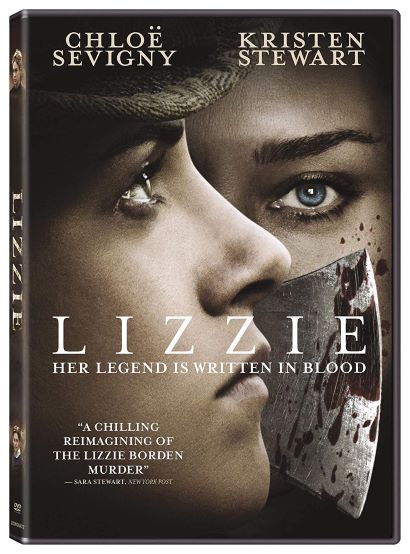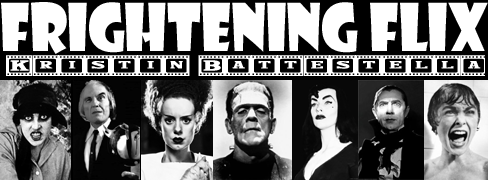Period Piece Horror Ladies by Kristin Battestella
What’s more wonderful than a gothic woman in fancy clothes and delicious settings experiencing crimes and ghosts with a dash of scandal, saucy, and the supernatural?
Angelica – A Victorian couple spirals into paranormal horrors thanks to puritanical repression in this brooding 2017 tale starring Jena Malone (The Neon Demon), Janet McTeer (Albert Nobbs), and Ed Stoppard (The Frankenstein Chronicles). Ghostly photography, flashbulbs, and empty chairs contrast the bustles, parasols, and formalities before lanterns, carriages, fine townhouses, and storms. Bedridden confessions lead to earlier courtings with circus sideshows and talk of Darwinism versus the stiff upper lip British tapering their animal appetites. The microscope revealing disease causing organisms is almost as fantastic as the camera capturing spirits, and while it’s okay for a young lady to work in a stationery store selling nibs and ink, she can’t see her future husband’s laboratory. Our humble orphan now in elaborate red dresses is called a counter jumper by the aristocratic ladies, and she’s fearful of the bridal bed before enjoying it in a scandalously active montage. Bells toll amid talk of losing a mother nor wanting to be one, and this birth is graphic, not maternal bliss thanks to scalpels, screams, and both lives at stake. Unfortunately, the doctor says another pregnancy is not worth the risk, and the couple should “desist entirely” and close her garden. Our husband doesn’t want to seek pleasure elsewhere, but she can’t get into other..options…and favors their toddler over him. Soon, she’s completely revolted by her husband and obsessively attached to the child, and the wife is made to feel guilty about her health and desires by everyone in tense Victorian melodrama. Men in suits have no trouble warping her mind, but they are shocked to see a woman enter the medical theater amid animals in cages, exposed brains, and disturbing experiments that put the creepy back into the complex characterizations. Strange noises, visions of germs in the air, bugs in the woodwork, and wardrobes that open by themselves lead to more anger as the husband dislikes the chaos his overprotective wife is causing in their home. She won’t let these apparitions prey on her daughter – who also sees this floating ectoplasm man in her room. Is she putting more notions in the imaginative child’s head? Is this mental illness or is the repressed sexual energy seeping into the house itself? The maid calls in a scam artist spiritualist to ring bells, burn sage, and banish the banshees. Rather than a charlatan taking advantage, however, there’s a woman to woman understanding and courage – a protection spell is more like peace of mind somewhere between being a modest mother and the shame of enjoying sex. There are also unspoken lesbian veils, entertaining women while your husband’s away, putting their feet on the table, showing their legs, and drinking his best port. Drunken undressings provide laughter instead of rattling doors, swarming entities, prayers, and fires against evil. If he is not at home, who is festering this supernatural activity? The drama before the horrors may be slow to viewers expecting in your face scares a minute, but the intriguing characters are intertwined with the fear. Our mother needs to destroy the snake manifestations and demon man coming for her daughter before her husband sends her to Bedlam, and the once beautiful interiors become stifling as ghostly sexual encounters escalate to mind and bodies becoming one with blood and penetrations of a different kind. Although the bookends are unnecessary and this seems caught between two audiences – too much drama for horror fans and intrusive paranormal activity for period piece viewers – such Victorian horror drama with a touch of LGBT is perfect for fans of gothic mood and psycho-sexual dreadfuls.
 Lizzie – Maid Kristen Stewart (Twilight) gets steamy with the titular turn of the century murderess Chloe Sevingy (American Horror Story) in this 2018 biopic accented with fine costumes, rustic lighting, and vintage Victorian interiors. Six months before the screams and blood, the buttoned-up, repressed daughter is already defiant against the patriarchal oppression by going to theatre parties unaccompanied where low cut, colorful frocks contrast the tight collars and immediate sexual tension at home. The Bordens can’t have anything too extravagant despite being able to afford it, and Lizzie prefers the barn and animals to people, reading aloud in an innocent but antisocial loneliness. While some dialogue is a little too modern, our eponymous lady has a progressive, forceful, even masculine energy that can’t be contained with fainting spells. Our old maid is called a lesbian abomination but in turn rightfully calls her perverse, abusive father a lying coward before creaking floorboards, broken mirrors slid under the door, revenge injuries, and burned documents reveal the truth. The up-close camera often peers through the window, catching the glances as each lady looks at each other – the audience is in on the intimate possibilities but when your employer suggests his servant leave the door to her hot attic room open, she can’t exactly say no. The strict orders and behind closed doors implications are uncomfortable enough without the often seen exploitative, degrading visuals, and the women bond during intimate undressings and corset tightenings. Theft and rebellious acts increase amid suspicious business deals, threatening letters, and whispering relatives. The women have to eavesdrop to learn what the men are planning for them before violent punishments and one and all sitting at the dinner table like nothing has happened. Is murder the only way out of the hypocrisy? Were the violent tendencies always there or could you be crazy in love enough to kill? The ax is shown throughout the potboiler, and although the stifling camerawork may be disorienting to some viewers, it mirrors the closeness when it is both welcomed by the women or invaded by nasty men. Regardless of height, the unprotected ladies must look up to the creepy uncles, diminished and fearful of physical violence. Retro photo pops accent the bludgeoning editing before jail and witnesses on the stand provide the fallout from this infamous hatcheting. Premeditated accomplices, church bells, deliberate nudity, and out of control horror are worth the wait once the finale reveals the symbolically sexual posturing, vomit, and splatter. Some people just don’t have the stomach for this sort of thing while others so smooth have thought of everything. There is some unevenness with the characters – probably from when the project was envisioned as a television piece with bigger roles – and the killer romance meets Victorian women’s lib messages are mixed. However despite liberties suggesting what went on in this congested house and a decidedly quiet, not mainstream style that won’t be for everyone, this interesting perspective will have viewers studying this disturbing murder case with a sympathetic, personal anew.
Lizzie – Maid Kristen Stewart (Twilight) gets steamy with the titular turn of the century murderess Chloe Sevingy (American Horror Story) in this 2018 biopic accented with fine costumes, rustic lighting, and vintage Victorian interiors. Six months before the screams and blood, the buttoned-up, repressed daughter is already defiant against the patriarchal oppression by going to theatre parties unaccompanied where low cut, colorful frocks contrast the tight collars and immediate sexual tension at home. The Bordens can’t have anything too extravagant despite being able to afford it, and Lizzie prefers the barn and animals to people, reading aloud in an innocent but antisocial loneliness. While some dialogue is a little too modern, our eponymous lady has a progressive, forceful, even masculine energy that can’t be contained with fainting spells. Our old maid is called a lesbian abomination but in turn rightfully calls her perverse, abusive father a lying coward before creaking floorboards, broken mirrors slid under the door, revenge injuries, and burned documents reveal the truth. The up-close camera often peers through the window, catching the glances as each lady looks at each other – the audience is in on the intimate possibilities but when your employer suggests his servant leave the door to her hot attic room open, she can’t exactly say no. The strict orders and behind closed doors implications are uncomfortable enough without the often seen exploitative, degrading visuals, and the women bond during intimate undressings and corset tightenings. Theft and rebellious acts increase amid suspicious business deals, threatening letters, and whispering relatives. The women have to eavesdrop to learn what the men are planning for them before violent punishments and one and all sitting at the dinner table like nothing has happened. Is murder the only way out of the hypocrisy? Were the violent tendencies always there or could you be crazy in love enough to kill? The ax is shown throughout the potboiler, and although the stifling camerawork may be disorienting to some viewers, it mirrors the closeness when it is both welcomed by the women or invaded by nasty men. Regardless of height, the unprotected ladies must look up to the creepy uncles, diminished and fearful of physical violence. Retro photo pops accent the bludgeoning editing before jail and witnesses on the stand provide the fallout from this infamous hatcheting. Premeditated accomplices, church bells, deliberate nudity, and out of control horror are worth the wait once the finale reveals the symbolically sexual posturing, vomit, and splatter. Some people just don’t have the stomach for this sort of thing while others so smooth have thought of everything. There is some unevenness with the characters – probably from when the project was envisioned as a television piece with bigger roles – and the killer romance meets Victorian women’s lib messages are mixed. However despite liberties suggesting what went on in this congested house and a decidedly quiet, not mainstream style that won’t be for everyone, this interesting perspective will have viewers studying this disturbing murder case with a sympathetic, personal anew.
Rebecca – Artistic ingenue Emilia Fox (Merlin) – companion to wealthy gossip Faye Dunaway (Don Juan DeMarco) – is smitten by the suave yet mysterious Charles Dance (Bleak House) in this 1997 three hour Masterpiece adaptation of the Daphne Du Maurier novel. Sublime style, flapper headbands, candlelight, and long stem cigarettes add to the whirlwind 1927 Riviera’s scenic drives, classic convertibles, and charming hats. Unlike the immediately gothic grayscale of Alfred Hitchcock’s 1940 version, vivid color and visual depth layer this initially idyllic romance. Our unusual couple have each been shy, lonely, and sad, but Maxim de Winter admires this young lady’s innocence and honesty compared to the gilded aristocracy. Picnics, boat rides, a silly girl, a foolish old man – can they make a go of their differences? The dangerous curves and perilous drives suggest something slightly sinister brewing amid glimpses of the unforgettable and beloved by all Rebecca. It’s been a year since her death, yet everyone must remind Maxim of his late wife upon this surprising second marriage. The newlyweds return to the lovely English gardens and proper decorum at Manderley, the estate where the Emmy winning Diana Rigg’s (On Her Majesty’s Secret Service) icy housekeeper Mrs. Danvers won’t let go of the first Mrs. DeWinter’s memory. The household reception is awkward and chilly – the coastal brightness turns darker thanks to shadow schemes, lighting changes, and the looming silhouettes of both Mrs. Danvers and Rebecca. Despite being a large estate with a west wing facing the sea, the hefty staircases, huge windows, and great fireplace feel congested, closing in on the new, nervous Mrs. as she gets lost wandering the shuttered parts of the house, breaks priceless statues, and hangs her head like an admonished little girl. She doesn’t fit into the upper-class routine, but the brooding, often misunderstood Maxim doesn’t want her to become like those other cruel, aristocratic dames. Everyone is so heavy handed, formal, and not just unhelpful but resentful of how unlike Rebecca she is, and the couple regrets returning home to the rocky cliffs, beachside cottages, and distrustful staff. Crazy hermits, past gossip, vogue cousins too close for comfort, recreating previous fancy dress balls, and one big costuming faux pas strain the relationship further, but she can’t exactly ask her new husband about why the pieces on how Rebecca drowned aren’t coming together. Her room is still kept as is, almost in worship where our devoted housekeeper can express her creepy vicarious and pathetic intimacy, re-enacting brushing her madam’s hair and laying out her perfumed nightgown. Was Rebecca really so perfect? If she wasn’t would anybody actually say so? Her presence is overwhelming – not because of any actually supernatural mood or ghost, but because the obsessed Mrs. Danvers won’t let anyone forget, placing the fanatical pressures of her devotion on the second Mrs. de Winter. Foreboding strings add more ominous, however, the suspense is certainly helped by Maxim’s not coming clean on his life with Rebecca at the start. While some scenes are very similar to Hitchcock’s vision, this is also closer to the novel, and even if you’ve seen other adaptations, viewers are swept up in wondering how the secrets will play out in the finale. Fog, vintage boats, watery evidence, mistaken identities, inquests – the circumstances surrounding Rebecca’s life and death come to light, but our servant oversteps her bounds with cruelty, jealousy, and bullying suicidal whispers just to assure Rebecca everyone thought they knew and loved won’t die. Though more romantic than true crime, the fresh love, and warped liaisons are told swift and honestly as the scandalous true colors are revealed with fainting spells, medical discoveries, fiery rescues, and kisses in the rain. Indeed all the gothic staples are here with period mood and performances to match.
The Turn of the Screw – Downton Abbey alum Michelle Dockery joins Dan Stevens (again) and Nicola Walker (MI-5) in this ninety-minute 2009 BBC adaptation of the Henry James askew moving the repressed ambiguity to 1921 institutions with post-war doctors analyzing our governess’ infatuation with her employer, the topsy turvy male shortage, and of kilter Bly Manor. Fashions, hats, sweet automobiles, fine woodwork, and hefty antiques sell the refreshing setting, however, the nonsensical strobe flashes look amateur on top of the time-wasting, disjointed doctoring add-ons, and unnecessary narration. Visions of dalliances that initially upgrade the Victorian scandalous soon hit the viewer over the head one too many times as the governess imagines her master and his saucy approval. She insists she’s not the nervous type, but the dark interiors, maze-like staircases, and distorted camera angles add to the strange noises and creepy country manor unease. She’s in charge, above housekeepers and maids, but there are too many flighty women doing all the work in this house. Parasols and summer white contrast eerie fog and trains as her boy charge is expelled from school without explanation. The cheeky children whisper about their previous, pretty governess – unbothered by screams, accidents, or dying maids. Melancholy piano music, graveyard echoes, dark figures amid the trees, and faces in the window build on the female isolation, yet all insist there are no ghosts – surely she’s just hysterical, overwrought, and obsessed with men. Rumors of suicide and a woman ruined by her lover seem proved by hidden pictures of the master’s up to no good valet, and tales of his violence among the unprotected women are better than seeing suspect flashbacks. The prim style degrades to loose hair and nightgowns as our governess jumps to dire conclusions and possessive delirium, but the shouting about it afterward with her doctor interruptions break the tainted picnics and frantic tension. We don’t need his sounding board to deduce her fears, just let us see the abusive violence and water perils. Crazy laughter and disembodied voices escalate as the phantoms, repression, and projection possibilities culminate in a one on one battle for the truth. The deviations here are flawed, and while the horror lite is fine for gothic period piece fans, some viewers will expect more than to have it both ways attempt at the ghosts and crazy ambiguity. This isn’t the best version but thanks to the cast and unique setting, it can be a good introduction for audiences who haven’t seen The Innocents.
For More Gothic Horrors visit:



